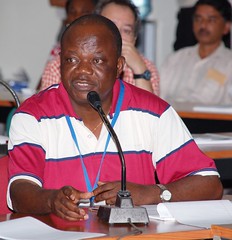RISING voices: Victor Manyong, chair Africa RISING ESA steering committee and director for IITA Eastern Africa Hub
Victor Manyong is the Africa RISING East and Southern Africa Project Steering Committee Chair. He is also the director for Eastern Africa Regional Hub and leader of the social science research group at the International Institute for Tropical Agriculture (IITA). In this interview which is part of a series of portraits of key people in Africa RISING, Manyong introduces himself and his role in Africa RISING.

Tell us about your background
I am an agricultural economist with many years’ experience conducting adoption and impact studies, production and marketing economics, and policy studies. Currently, I am the director for IITA-Eastern Africa assisting national and international staff to perform their task in an efficient manner. I am also the leader of the Social Science research group at the Institute and oversee its contribution to the CGIAR Research Programs on Policies, Institutions and Markets and Agriculture for Nutrition and Health.
I obtained my PhD degree in agricultural economics from the Catholic University of Louvain-la-Neuve (UCL) in Belgium where I also worked as a Research Fellow after my doctorate studies. Back home in DRC, I also worked for the private sector as a director of development programs and later worked with an international German NGO for two years.
What do you do in your current position at Africa RISING?
I am the chairperson of the steering committee of the Africa RISING project in East and Southern Africa which provides guidance and oversight to the project. We meet once a year, physically, during the project’s annual meeting and also interact online through email/Skype in between. As the steering committee, we approve budgets, provide input into the project’s annual report, and advise the project implementation team.
In your opinion, what have been some of your key achievements under Africa RISING and the key achievements of the overall program in general so far?
As the chair of the steering committee, my achievements are linked to the committee’s tasks which are to make sure the project meets its objectives. We support the project through making recommendation to the project manager.
The project, which is being implemented in Tanzania and Malawi for East and Southern Africa, has made a lot of achievements since it was initiated about four years ago. It has managed to deal with complex issues and many partners to address multiple sustainable intensification issues. Putting these multiple issues in a programmatic project is not always easy and so far Africa RISING has been doing this very well.
Moreover, there have been good outputs from the field. Innovation platforms have been established in the project sites. The platforms, which bring together the beneficiaries, policy makers, and other stakeholders, enhance effective implementation of the project in the given project sites.
What have been some of useful lessons that have been learnt along the way?
Well, I have learnt to believe in the program and its goal. When we are dealing with any type of complex program we always encounter a lot of problems/challenges, therefore if you do not strongly believe in a project and its goals, you can easily back down from the project. We need to be patient when dealing with any kind of complex program.
I have also learnt that creating trust among partners is something that needs to be built up over time, and one should not expect quick results. We need to always create an environment in which we can get to know and trust one another.
Keeping the donor updated on a regular basis is also important. The Project Manager has kept a good link with both the donors and IITA management, informing them on a regular basis of ongoing project activities and achievements/challenges.
Another project lesson is that we need to see real achievement in the field, because we are aiming to change the livelihoods of farmers. We need to make sure the beneficiaries are benefiting from the project. If the farmers are not able to see the benefit of this program, then probably we will not achieve any sustainable impact.
What are the current major challenges in Africa RISING and how do we deal with them?
The biggest challenge that we are facing for now is how to consolidate/strengthen what has been achieved so far. We are now moving to phase two, how will phase two look in comparison to phase one?
Another challenge is how the project management integrates into the changing environment of the CGIAR. We have the CGIAR and Africa RISING is a part of it, how will phase two integrate itself into the ongoing CGIAR reforms? These are issues that the project management team is looking into on a daily basis.
What are your plans for Africa RISING as phase one winds down?
For the IITA management, we believe that this is a good project that must continue. We hope to convince the donor(s) to provide financial support for phase two. However, in order to convince the donor(s) to support a second phase, we need to have a good/solid program.
I believe the project has matured and we have the experience to develop a convincing program that the donors/other institutions will be willing to support.
What gives you hope looking at a possible second phase, based on the first phase?
Well, my hope is based on the achievements of phase one. Currently the project is acknowledged as one of the best programs for sustainable intensification. It has made some good and key achievements that show that the program is on the move and we need to build on its successes.
Initially, the program was only for Malawi and Tanzania, currently the project is expanding to Zambia. My expectations are that the East and Southern Africa RISING program will cover all three countries. I have high hopes that the project is moving to phase two.




